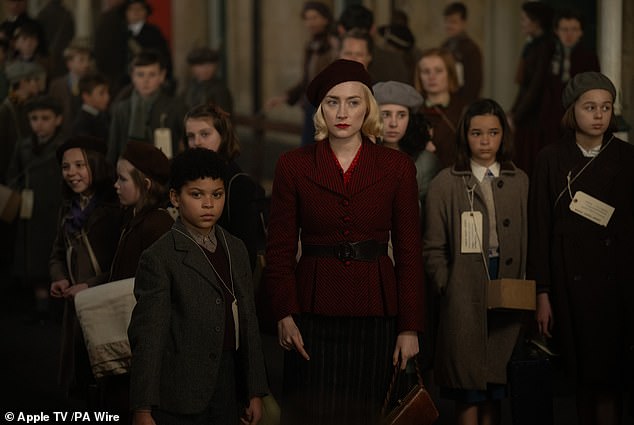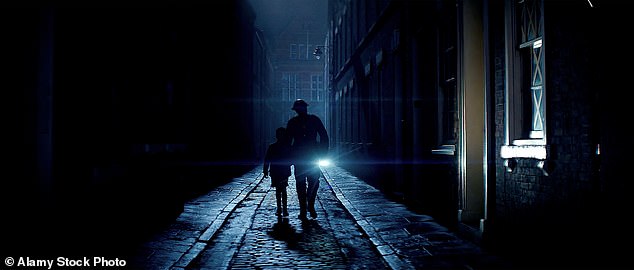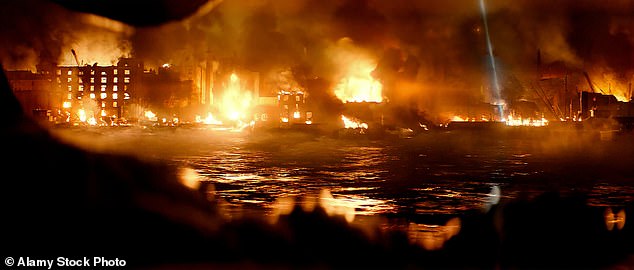Blitz review: Perilous trip into wartime underworld for the Blitz’s Oliver Twist, writes BRIAN VINER
Blitz (PG)
Verdict: an explosive start
This year’s London Film Festival couldn’t have had a more fitting curtain-raiser last night than Blitz, a gripping drama set in September 1940, just after the Luftwaffe began its intense eight-month bombing campaign on the city.
It felt downright eerie to leave the cinema on London’s Southbank and see, across the Thames, the dome of St Paul’s Cathedral – once the city’s structural symbol of resistance to Hitler.
Working-class Londoners have, of course, always been a human symbol of resistance in the Second World War, depicted time and time again on screen as the epitome of courageous, selfless courage.
But in Blitz, writer-director Sir Steve McQueen is not afraid to blow up that old image.
McQueen focuses on a family of three in the East End. Single mother Rita (Saoirse Ronan, left) shares a terraced house with her nine-year-old son George (centre) and her father Gerald (played by musician Paul Weller in his acting debut)

Blitz hits theaters on November 1. The film opens spectacularly with a firefighter being knocked unconscious by an out-of-control hose, and later there is a brilliantly orchestrated scene in which a subway station is flooded.
Some of the characters in this enjoyably compelling film have distilled the cherished Blitz spirit into something sour. For example, while everyone else is rolling out the barrel, there is a criminal gang at work, stripping the dead of their jewels.
McQueen focuses on a family of three in the East End. Single mother Rita (Saoirse Ronan) shares a terraced house with her nine-year-old son George (impressive newcomer Elliott Heffernan) and her father Gerald (played by musician Paul Weller in his acting debut).
The boy is of mixed race, the product of Rita’s relationship with a West Indian man, who has since been deported.
McQueen, whose own parents also came from the West Indies, was inspired to create this yarn by a single war photo of a young black evacuee.
Race and racism lurk. But at its core it’s an old-fashioned adventure story about a feisty little boy who becomes enraged when his devoted mother reluctantly decides he must be evacuated and is unconvinced by her empty rhapsodies about the countryside. “Cows and horses stink,” he says.

Blitz is a drama set in September 1940, just after the Luftwaffe began its intense eight-month bombing campaign on the city.

The aftermath of the bombing of Café de Paris (which actually took place in March 1941) is meticulously recreated in the film.
Moments later he jumps out of the train and takes it to safety and begins his arduous odyssey home.
Blitz is a chronicle of that return journey, which, for dramatic purposes, is predictably fraught with danger.
Nevertheless, McQueen still cleverly subverts our expectations and is reminiscent of The Railway Children (1970) when George jumps aboard another train and befriends three young brothers who have done the same – only then the tragedy causes our own sentimental journey comes to a screeching halt.
There are also clearly deliberate echoes of Oliver Twist, when George is introduced by a sort of Nancy figure in the story version of Bill Sikes, played by Stephen Graham, with Kathy Burke as his grotesquely painted partner-in-crime.
You assume that their gang of thieves has a basis in reality.
Throughout the film, McQueen deftly interweaves fact with fiction.

Saoirse Ronan attends the world premiere “Blitz” today at the 68th BFI London Film Festival’s Opening Night Gala at the Royal Festival Hall
The aftermath of the bombing of the Café de Paris (which actually took place in March 1941) is meticulously recreated, and there really was a vociferous campaign by Londoners to be allowed to take shelter in tube stations, which neatly brings me to Paul’s Going Underground Weller.
The so-called ‘Modfather’ is daring but perfectly cast as a wartime East End grandfather – and looks exactly as if he could be Ronan’s old dad.
She’s also wonderful, as she always is, as a mother at her wits’ end with worry.
But it is Heffernan on whom the story’s credibility rests, and his young shoulders carry the burden comfortably.
The other thing McQueen needs to rectify – and does – is the specific tumult and trauma of the London Blitz.
The film opens spectacularly with a firefighter being knocked unconscious by an out-of-control hose, and later there is a brilliantly orchestrated scene in which a subway station is flooded.
I only had one quibble: While hiding from the bombs, a Nigerian ARP guard named Ife (Benjamin Clementine), apparently based on a real person, gives a speech about tolerance to a small gathering conveniently made up of a Sikh, a Jew and a white man. fanatic, who has hung a sheet as a means of segregation.
It’s a chillingly constructed episode, far too clearly from a screenwriter’s keyboard, and emblematic of McQueen’s more general and rather surprising inability to get preconceptions quite right.
There are some horrible racists in his story and everyone else is completely color blind, but society doesn’t work that way now, and I’m sure it was even more nuanced in 1940.
That aside, he has made a fine film, with which the 68th London Film Festival got off to a resounding start. Blitz hits theaters on November 1.
